- Home
- Michael P. Spradlin
Keeper of the Grail
Keeper of the Grail Read online
THE YOUNGEST TEMPLAR
B OOK O NE
KEEPER OF THE GRAIL
Michael P. Spradlin
G. P. PUTNAM’S SONS
G. P. PUTNAM’S SONS
A division of Penguin Young Readers Group.
Published by The Penguin Group.
Penguin Group (USA) Inc., 375 Hudson Street, New York, NY 10014, U.S.A.
Penguin Group (Canada), 90 Eglinton Avenue East, Suite 700, Toronto, Ontario M4P 2Y3, Canada (a division of Pearson Penguin Canada Inc.).
Penguin Books Ltd, 80 Strand, London WC2R 0RL, England.
Penguin Ireland, 25 St. Stephen’s Green, Dublin 2, Ireland (a division of Penguin Books Ltd.).
Penguin Group (Australia), 250 Camberwell Road, Camberwell, Victoria 3124, Australia (a division of Pearson Australia Group Pty Ltd).
Penguin Books India Pvt Ltd, 11 Community Centre, Panchsheel Park, New Delhi—110 017, India.
Penguin Group (NZ), 67 Apollo Drive, Rosedale, North Shore 0632, New Zealand (a division of Pearson New Zealand Ltd).
Penguin Books (South Africa) (Pty) Ltd, 24 Sturdee Avenue, Rosebank, Johannesburg 2196, South Africa.
Penguin Books Ltd, Registered Offices: 80 Strand, London WC2R 0RL, England.
Copyright © 2008 by Michael Spradlin.
All rights reserved. This book, or parts thereof, may not be reproduced in any form without permission in writing from the publisher, G. P. Putnam’s Sons, a division of Penguin Young Readers Group, 345 Hudson Street, New York, NY 10014.
G. P. Putnam’s Sons, Reg. U.S. Pat. & Tm. Off. The scanning, uploading and distribution of this book via the Internet or via any other means without the permission of the publisher is illegal and punishable by law. Please purchase only authorized electronic editions, and do not participate in or encourage electronic piracy of copyrighted materials. Your support of the author’s rights is appreciated.
The publisher does not have any control over and does not assume any responsibility for author or third-party websites or their content.
Library of Congress Cataloging-in-Publication Data
Spradlin, Michael P.
Keeper of the Grail / by Michael P. Spradlin.
p. cm.—(The youngest Templar; bk.1) Summary: In 1191, fifteen-year-old Tristan, a youth of unknown origins raised in an English abbey, becomes a Templar Knight’s squire during the Third Crusade and soon finds himself on a mission to bring the Holy Grail to safety.
[1. Knights and Knighthood—Fiction. 2. Grail—Fiction. 3. Middle Ages—Fiction.
4. Crusades—Third, 1189–1192—Fiction.] 1. Title.
PZ7.S7645Kee 2008 [Fic]—dc22 2007036143
ISBN: 978-1-1011-5864-7
This book is for my son Michael Patrick Spradlin, Jr. You have made me a rich man in sons.
ALSO BY MICHAEL P. SPRADLIN
Spy Goddess: Live and Let Shop
Spy Goddess: To Hawaii with Love
Spy Goddess: The Chase for the Chalice
Contents
ACKNOWLEDGMENTS
PROLOGUE
ST. ALBAN’S ABBEY, ENGLAND
Chapter 1
Chapter 2
Chapter 3
Chapter 4
Chapter 5
DOVER, ENGLAND
Chapter 6
Chapter 7
Chapter 8
Chapter 9
Chapter 10
Chapter 11
ON THE SEA TO OUTREMER MAY 1191
Chapter 12
OUTREMER, THE HOLY LAND
Chapter 13
THE CITY OF ACRE, OUTREMER JUNE 1191
Chapter 14
Chapter 15
Chapter 16
Chapter 17
ON THE ROAD TO TYRE
Chapter 18
Chapter 19
Chapter 20
Chapter 21
Chapter 22
Chapter 23
Chapter 24
Chapter 25
THE CITY OF TYRE
Chapter 26
Chapter 27
Chapter 28
Chapter 29
Chapter 30
ON THE SEA
Chapter 31
ACKNOWLEDGMENTS
It takes a village to raise a book, and this one would not have been possible without the help, support and dedicated efforts of numerous individuals.
First I thank Timothy Travaglini, my editor, for his patience and friendship, and for believing in the story from the beginning. I also thank my agent, Steven Chudney, for his guidance and advice. To my writer friends Christopher Moore, T. Jefferson Parker, Mary Casanova and Meg Cabot, thanks for the advice, wisdom and encouragement. And for letting me bounce ideas off all of you when you’d probably rather be writing your own books instead of listening to me yammer on.
I’d also like to thank Naomi Williamson and the staff and volunteers who coordinate the fantastic Children’s Literature Festival at the University of Central Missouri each year. They do very important work: bringing authors and children together in a celebration of books and writing. They’ve given me a marvelous opportunity to reach and encourage hundreds of young readers, and I’m humbled and honored to be a part of the event each year.
My family is the world’s greatest support system. My mom has encouraged me my whole life, no matter what I’ve chosen to do, with a smile and a “That’s wonderful, dear!” Thanks, Mom. My sisters Connie and Regina have likely alienated everyone they know by regaling friends, coworkers and strangers on the street with stories of their little brother’s writing exploits. To my knowledge no restraining orders have been filed yet. To the two best kids any dad could ask for, I say thanks to Mick and Rachel. And to my wife, Kelly, the greatest wife in the whole history of wives, with all the love and gratitude I can muster for sticking by this big, dumb Irishman for the last twenty-six years. I love you all.
PROLOGUE
This time in which we live will one day be called the Dark Ages. What a fitting name. I have done all I can to stand against the darkness, though I still feel it pressing in around me. I had hoped I would find safety here, but that has turned out to be a foolish dream. I have come so far. Not much farther now. Can I bring an end to this?
I am alone now. Sir Thomas sent me from Acre with a few coins, and I’ve kept his sword and ring. I have enough, if I am careful, to see me through this duty, but there may come a day when I must sell the sword and ring.
I miss Sir Thomas. He was kind, and there was always food. The work was hard and full of danger, for what is a Crusade but another word for war? He trained me well and was not overly pious like so many of his fellows.
Now I must decide what path to take. I have traveled far and endured much to fulfill a promise to a doomed knight. Should I continue on to face those who would see me dead for what I possess? In the last few months I have learned much about fate. For Sir Thomas was no ordinary knight. My master and liege, Sir Thomas Leux, served his God as a member of the Knights Templar. And in the simple leather satchel that never leaves my shoulder, I, a mere orphan, an unworthy soul, am now the protector of the Holy Grail, the most sacred relic in all of Christendom.
For centuries legend has said that this simple bowl-shaped chalice caught the blood of Christ as he died upon the cross. And because it once held the blood of the Savior, some believe it to have magical properties. To find it has been the life’s goal of countless men.
I heard some of the Templars say that whoever possesses the Grail will be invincible; their armies cannot be defeated in battle. This is why the knights were so fanatical about keeping it hidden, lest it fall into the hands of the Saladin. Truth be known, I do not think much of these stories. If the Grail really makes one’s army invin
cible, then why didn’t the Templars carry it into battle and drive the Saladin and his warriors from the field? Perhaps the Saracens have their own sacred relic that cancels out the power of the Grail?
Whatever its legend, even the idea of the Grail is a powerful thing. Though it may or may not be the true cup of Christ, it is a symbol. And in my short life, if I have learned anything, I have learned the power of symbols, from the bright red crosses on the Templars’ tunics, to the crucifix that hangs in the chapel of the abbey. Symbols can make human beings behave in less than honorable ways.
No matter the cost, I must now carry this valuable thing to safety. Sir Thomas considered it my duty.
I consider it my curse.
ST. ALBAN’S ABBEY, ENGLAND MARCH 1191
1
Though I am called Tristan, I have no true name of my own. It was Brother Tuck who found me on St. Tristan’s Day, nearly fifteen years ago. He is a kind and gentle man, but a deaf-mute, and unable to even write down for me how I came to be here. The abbot, a much sterner sort, tells me that I was found that August night on the steps of the abbey. A few days old at best, hungry and crying, wrapped in a soiled woolen blanket.
I’m told the sound of horses could be heard riding away through the night, but since Brother Tuck was the first to find me, we know not if he saw or even glimpsed the riders. The abbot said that two of the brothers followed the tracks into the woods but soon lost the trail.
He also thinks I must be of noble blood. No peasant could afford to own such horses, and it is unlikely a poor farmer would abandon an infant that might one day grow strong enough to help him work the farm. Nor would any illiterate peasant likely be able to write the note that was neatly tucked into the folds of my blanket. On a simple scrap of rolled parchment, wrapped with red ribbon, it read, “Brothers: We bestow onto you this innocent child. His life threatens many. Remind him that he was loved, but safer away from those who would wish him harm. We will be watching over him until it is time.”
So whoever left the note must consider me safe now that I am nearly fifteen. For as near as anyone at the abbey can tell, no one has ever come here and asked about or “watched over” me in any way. Perhaps my parents, whoever they are, were unable to fulfill that promise.
The monks were always kind to me, but they were Cistercians and believed that one was never too young to work. I earned my keep there. However, I bore them no ill will, for the monks worked just as hard as I did. I lived at St. Alban’s for all of my life, and my earliest memories were not of the names and faces of the monks, but of chores. We were a poor abbey but grew enough crops and raised enough sheep and goats to get by. Our needs were few. There was wood in the surrounding forest to see us through each winter. The gardens provided us with plentiful vegetables, and the fields gave us wheat, which we turned into bread. If there was ever anything else we needed, the brothers traded for it in Dover or one of the nearby villages.
It was a quiet and calm existence, but the work was endless. The garden was my main contribution to the abbey. Brother Tuck and I tended it from planting in the spring to harvest in the fall. Working the hoe through the soil was quiet work, and gave me much time to think. The garden sat in a sunny spot behind the abbey, and once the rainy spring was over, the weather was usually fine and fair.
Our abbey was on the travelers’ road a day’s ride northwest of Dover. There were thirty monks in service there. Built many years ago it rose up out of the surrounding forest like a small wooden castle. It was simple in its design, because Cistercians are not frivolous, believing man is here to serve God, not adorn his buildings in finery.
Still, it was a comfortable place, inviting and welcoming to the few travelers who passed our way. The main hall where the brothers gathered to dine and pray was well lighted by the windows that rose high in the peaks. The surrounding grounds were neat and well tended, for the brothers believed that keeping things orderly kept one’s mind free to focus on God.
Except for the forest around the abbey grounds, and a trip to Dover three years before, I had seen no more of the world—though that was not all I knew of it. The monks offered shelter to travelers along the road to Dover, and from them I heard things. Exciting things happening in far-off places that made me wish for a chance to leave and see them for myself. Some told tales of wonder and adventure, of magnificent battles and exotic places. Recently, most all of the talk was of the Crusade. King Richard, who some called the Lionheart, carried out his war in the Holy Land, and it wasn’t going well. King Richard had been on the throne for almost two years, and had spent most of his time away from England fighting in the Crusades. He was called the Lionheart because he was said to be a ferocious warrior, brave and gallant, and determined to drive the Saladin and his Saracens from the Holy Land.
The Saladin was the leader of the Muslim forces opposing King Richard. He was said to be as courageous and fierce a warrior as the Lionheart, consumed with ridding the Holy Land of Christians. Even those who said that God was on our side conceded that defeating the Saladin would not be easy.
For the monks, the news from the east was of particular interest. To them, the rise of the Saladin was a signal that the end of days was near. Perhaps the Savior would soon come again.
These were my thoughts, on a clear and sunny day, as I worked beside Brother Tuck in the garden. Brother Tuck was a large man, strong and sturdy, with a generous heart. Though he couldn’t speak, he made a soft humming noise while pushing his hoe through the soil, moving to some rhythm only he felt. He could not hear the riders approach, or the sound of horses’ hooves pounding across the hard ground, or the clang of chain mail and sword as the knights reined up at the abbey gate.
Knights wearing the brilliant white tunics with red crosses emblazoned across their chests. The Warrior Monks. The famous Poor Fellow Soldiers of Christ and of the Temple of Solomon. Known to all as the Knights Templar.
2
The knights rode through the abbey gate into the shade of the tall trees lining the courtyard. I counted twenty in the group, well mounted, their chain mail gleaming in the morning sunlight. The abbot walked down the front steps to greet the travelers.
“Welcome, soldiers of God,” he said.
I stopped working, leaning on my hoe to watch from the garden. I tapped Brother Tuck on the shoulder and pointed to the Templars astride their horses in the courtyard.
A tall, thin knight wearing a gilded cowl dismounted, removing his helmet, and greeted the abbot.
“Thank you, Father,” he said. His voice was high pitched and seemed out of character for a warrior. Templars were forbidden to shave their beards, but this one’s was sparse, as if he could not grow a full one. His face was pinched as though his helmet were too tight and had forced his features into a permanent scowl. He wore a Marshal of the Order emblem on his tunic, which meant he was in command.
“My name is Sir Hugh Monfort; we are bound for Dover and the Holy Land.” He pointed to another knight, who dismounted and stood holding the reins of his horse. “This is Sir Thomas Leux, my second in command. We have ridden far this day and wish to rest here this evening,” he said.
“You are welcome to all that we have, sire,” said the abbot. “We are a poor abbey but rich in spirit. I shall have some of the brothers assist you with your horses and you shall dine with us this evening.”
Sir Hugh gave the order to his men to stand down. The knights dismounted. Some of them began to stretch, shaking their legs and arms, tired as they were from their journey.
“Tristan!” I heard the abbot call my name.
“Yes, Father?” I asked as I ran over from the garden.
“Make room for our visitors’ mounts in the stable, then return with some rope to help them hobble the rest here in the courtyard. They are welcome to our feed and hay,” he said.
“Yes, Father,” I said.
Sir Thomas, who had overheard our conversation, stepped forward, removing his helmet and holding the reins of his horse in
his hand. He was a head taller than I, and a large battle sword hung at his belt. Though his face was covered in dust, I could see a long scar on his cheek that traveled from his right eye down his face until it disappeared in the tangle of his beard. His hair was a reddish-brown color, and an easy smile came to his face.
“After you, lad,” he said.
I led him across the courtyard while Sir Hugh remained behind talking with the abbot. The other knights mingled with some of the brothers, waiting for me to return with rope. Our path led around behind the main building to the back where our outbuildings lay. We kept a small stable there, with a brace of draft horses, two milk cows and some goats. In addition to my garden duties I cared for most of the animals at the abbey.
As we walked toward the stables, the knight introduced himself.
“My name is Sir Thomas Leux,” he said.
I stopped and turned to bow, but he waved me off. A knight was nobility, and it was my obligation to bow to him.
“Ah, no need to bow. We don’t stand on such formalities in times such as these,” he said. “Tristan, is it?”
“Yes, my lord,” I said, still partly bowing out of habit.
I noticed that Sir Thomas’ tunic was frayed and that his boots were caked with dust and mud. His mail was tarnished, the rust showing through in several places. The shining hilt of the sword that hung at his belt, however, gleamed in the sunlight.
“I beg your pardon, but you seem a bit young to be a brother,” he said.
“I have not taken vows, sire,” I said. “I am an orphan. The monks have raised me from a babe.”
“Ah. Well, you grow strong and straight. It would seem they do right by you,” he said.
As we reached the stable, I pulled open the door, taking the reins of his horse and leading him to one of the empty stalls.

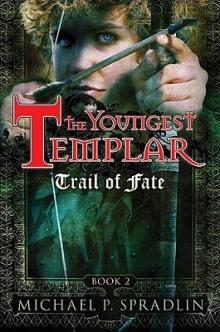 Trail of Fate
Trail of Fate Alcatraz
Alcatraz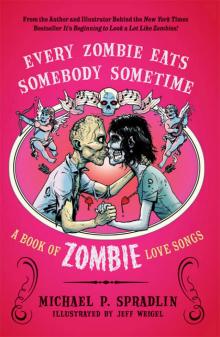 Every Zombie Eats Somebody Sometime
Every Zombie Eats Somebody Sometime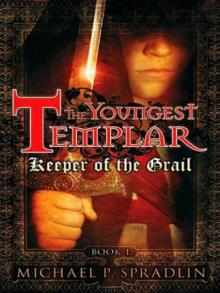 Keeper of the Grail tyt-1
Keeper of the Grail tyt-1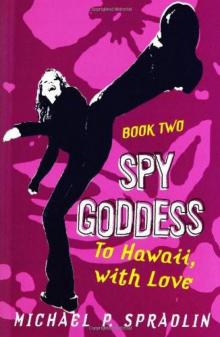 To Hawaii, with Love
To Hawaii, with Love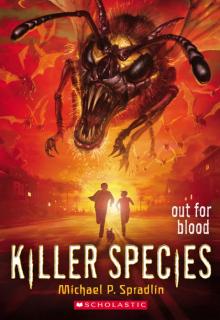 Out for Blood
Out for Blood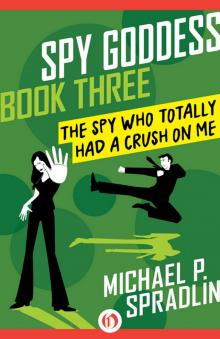 The Spy Who Totally Had a Crush on Me
The Spy Who Totally Had a Crush on Me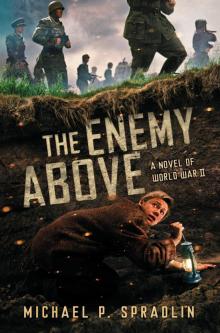 The Enemy Above
The Enemy Above Menace From the Deep
Menace From the Deep It's Beginning to Look a Lot Like Zombies
It's Beginning to Look a Lot Like Zombies Feeding Frenzy
Feeding Frenzy 3 The Spy Who Totally Had a Crush on Me
3 The Spy Who Totally Had a Crush on Me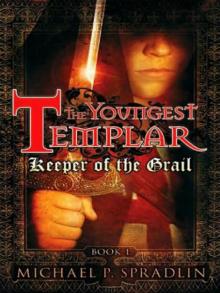 Keeper of the Grail
Keeper of the Grail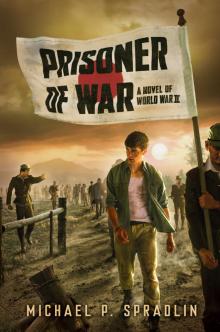 Prisoner of War
Prisoner of War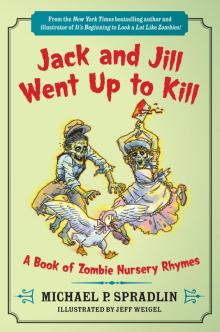 Jack and Jill Went Up to Kill
Jack and Jill Went Up to Kill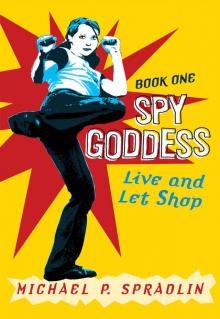 Live and Let Shop
Live and Let Shop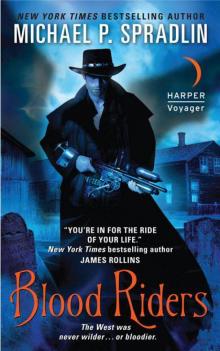 Blood Riders
Blood Riders Ultimate Attack
Ultimate Attack